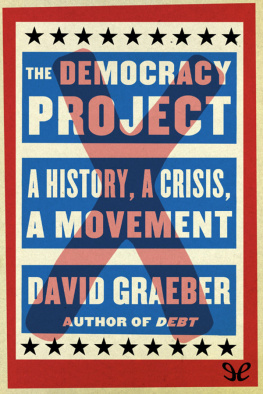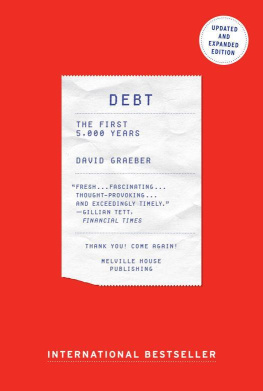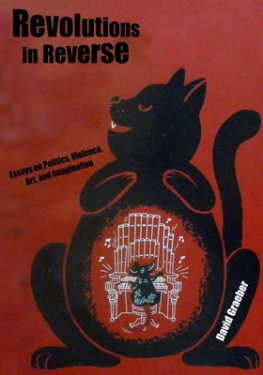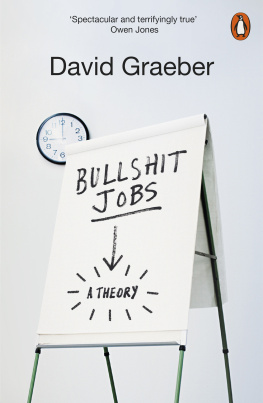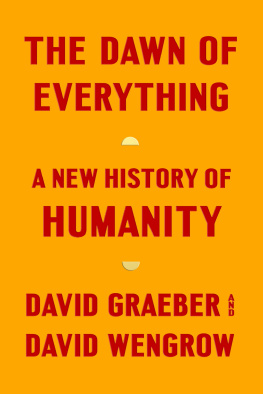David Graeber - Possibilities: Essays On Hierarchy, Rebellion, and Desire
Here you can read online David Graeber - Possibilities: Essays On Hierarchy, Rebellion, and Desire full text of the book (entire story) in english for free. Download pdf and epub, get meaning, cover and reviews about this ebook. year: 2013, publisher: AK Press, genre: Religion. Description of the work, (preface) as well as reviews are available. Best literature library LitArk.com created for fans of good reading and offers a wide selection of genres:
Romance novel
Science fiction
Adventure
Detective
Science
History
Home and family
Prose
Art
Politics
Computer
Non-fiction
Religion
Business
Children
Humor
Choose a favorite category and find really read worthwhile books. Enjoy immersion in the world of imagination, feel the emotions of the characters or learn something new for yourself, make an fascinating discovery.

- Book:Possibilities: Essays On Hierarchy, Rebellion, and Desire
- Author:
- Publisher:AK Press
- Genre:
- Year:2013
- Rating:4 / 5
- Favourites:Add to favourites
- Your mark:
- 80
- 1
- 2
- 3
- 4
- 5
Possibilities: Essays On Hierarchy, Rebellion, and Desire: summary, description and annotation
We offer to read an annotation, description, summary or preface (depends on what the author of the book "Possibilities: Essays On Hierarchy, Rebellion, and Desire" wrote himself). If you haven't found the necessary information about the book — write in the comments, we will try to find it.
Possibilities: Essays On Hierarchy, Rebellion, and Desire — read online for free the complete book (whole text) full work
Below is the text of the book, divided by pages. System saving the place of the last page read, allows you to conveniently read the book "Possibilities: Essays On Hierarchy, Rebellion, and Desire" online for free, without having to search again every time where you left off. Put a bookmark, and you can go to the page where you finished reading at any time.
Font size:
Interval:
Bookmark:
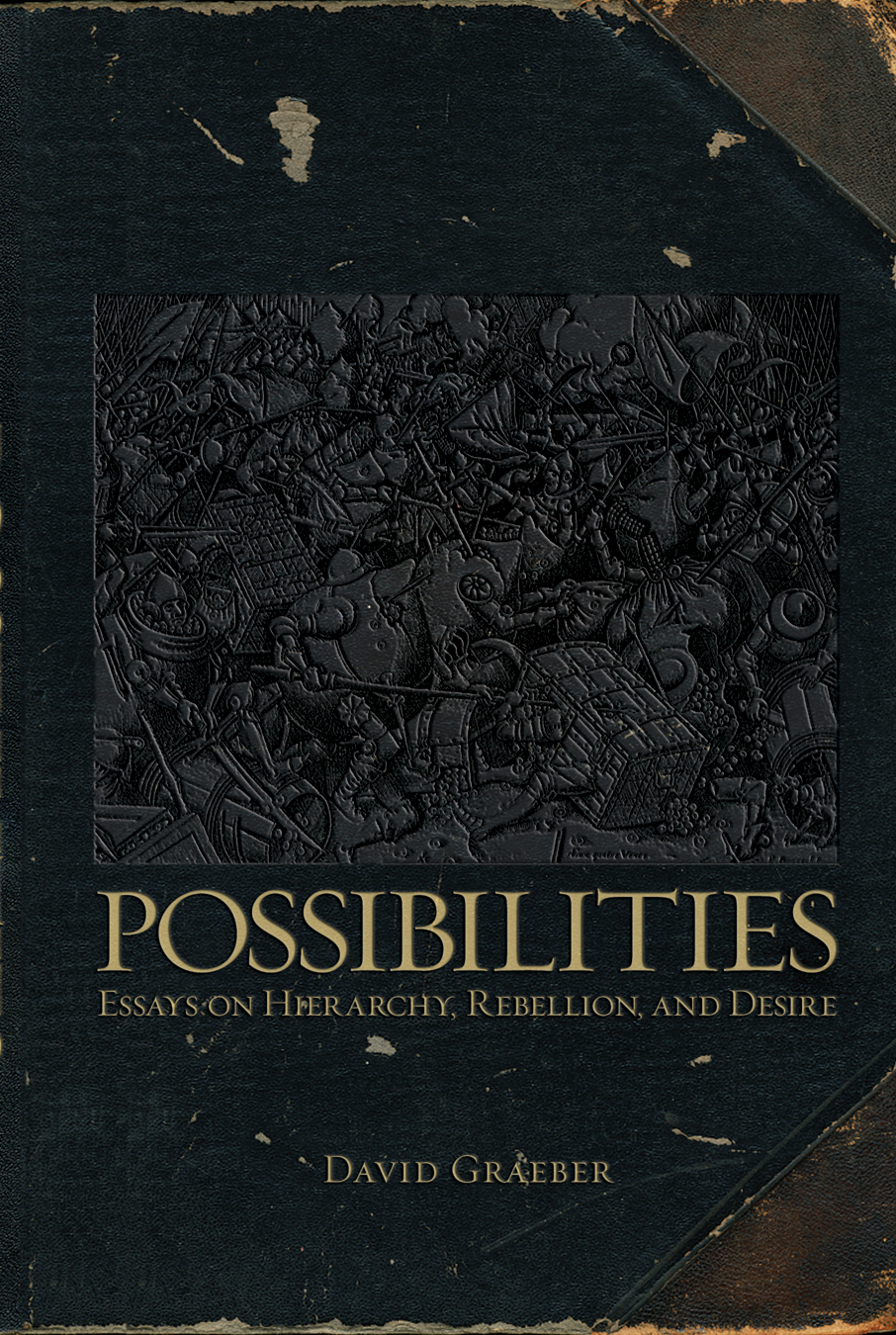
Possibilities: Essays on Hierarchy, Rebellion, and Desire
by David Graeber
ISBN 978-1904859-66-6
Library of Congress Number: 2007928387
2007 David Graeber
This edition 2007 AK Press
Earlier versions of essays in this collection appeared in the following publications:
Chapter 1: Manners, Deference, and Private Property. Comparative Studies in Society and History 39/4 (Spring 1997): 694728.
Chapter 3: Turning Modes of Production Inside Out: Or, Why Capitalism is a Transformation of Slavery (short version). Critique of Anthropology 26 /1 (March 2006): 6181.
Chapter 4: Fetishism and Social Creativity: Or, Fetishes are Gods in Process of Construction. Anthropological Theory 5/4 (2005): 407438.
Chapter 5: Catastrophe: Magic and History in Rural Madagascar. Campos: Revista de Antropologia Social 5/1 (2004): 930.
Chapter 6: Dancing with Corpses Reconsidered: An Interpretation of Famadihana in Arivonimamo, (Madagascar). American Ethnologist 22/2 (May 1995): 258278. Reprinted in Religion in Culture and Society, edited by John R. Bowen (Boston: Allyn & Bacon, 1997).
Chapter 7: Love Magic and Political Morality in Central Madagascar, 18751990. Gender and History 8/3 (November 1996): 416439. Special issue on Gendered Colonialisms in African History, which also appeared as a book of the same (edited by Jean Quataert, et. al., Oxford: Blackwell, 1997).
Chapter 10: La sociologie comme science et comme utopie. Revue du MAUSS Semestrielle 24 (2004), Une thorie sociologique gnrale est-elle pensable? Second Semestre: 205217.
Chapter 11: La dmocratie des interstices. Revue du MAUSS Semestrielle 26 (2005), Alter-dmocratie, alter-conomie: chantiers d lesprance. Second Semestre: 4189.
Introduction
I decided to call this collection Possibilities because the word encompasses much of what originally inspired me to become an anthropologist. I was drawn to the discipline because it opens windows on other possible forms of human social existence; because it served as a constant reminder that most of what we assume to be immutable has been, in other times and places, arranged quite differently, and therefore, that human possibilities are in almost every way greater than we ordinarily imagine. Anthropology also affords us new possible perspectives on familiar problems: ways of thinking about the rise of capitalism from the perspective of West Africa, European manners from the perspective of Amazonia, or, for that matter, West African or Amazonian masquerades from the perspective of Chinese festivals or Medieval European carnival.
One common feature of the essays collected in this book is that they are meant to keep possibilities open. They are not, in any sense, an attempt to create a single grand theory of anythinglet alone, a single grand theory of everything. Think of them instead as an attempt to put some of the pluralism I espouse in the later essays into practice.
I often make the argument that (at least as a theoretical problem) incommensurability is greatly overrated. Take any two people, even in the same family or community, and you are likely to find half a dozen incommensurable perspectives. None of us completely understand each other. In practice, the fact that we dont rarely gets in the way of our living together, working together, or loving one another, and it is often an actual advantage when people, say, come together to solve a common, practical problem. Its only when we start imagining that the world is somehow generated by the descriptions we make of it that incommensurability becomes a well-nigh existential dilemma. Of course, the world is not really generated by the descriptions we make of it, as most of us are, occasionally, forced to recognize when some aspect of the world we had not included in our descriptions suddenly contrives to hit us on the head (sometimes figuratively, sometimes not). This book, then, is meant to assemble a series of different and sometimes even incommensurable perspectives on a very real world. They are unified, above all, by a commitment to the idea that that world could possibly look very different than it doesbut just as much, perhaps, by the belief that, ultimately, the very combination of anger and curiosity, of intellectual play and creative pleasure that goes into crafting any worthwhile piece of critical social theory also itself partakes of something of the powers that could transform that world into something better. What unites them, then, is a utopian ideal.
The 3-part organization of the volume is broadly autobiographical. Part I, entitled Some Thoughts on the Origins of Our Current Predicament, represents the kind of work I was doing in the 1980s in graduate school at the University of Chicago. Much of it emerges from research into the origins of capitalism. However, since, as my old mentor Marshall Sahlins has never ceased to point out, capitalism has by now played such a fundamental role in shaping our fundamental assumptions about the nature of human beings, human desires, and the very possibilities for human social relations, all of these essays are by necessity reflections on such larger questions at the same time. I first began trying to puzzle out some of these issues in my Masters paper, submitted in 1987a much shorter, and updated, version of which appears as Chapter 1. This essay, ostensibly about the history of manners, has a curious history in its own right. Shortly after I finished it, the French sociologist Pierre Bourdieu was visiting the University of Chicago anthropology department. Bourdieu was then at the height of his popularity, and everyone wanted to meet him, but he was much more interested in talking to students than with facultysince, as he later remarked to a group of us, with students, you can actually discuss ideas. Your colleagues, all they want to do is kill you. He announced office hours, and for several days beforehand there was a sign-up sheet on the door. I myself was far too timid to actually put my name on it. As it turned out, so was most everyone else. Late on the afternoon of Bourdieus visit, my friend Becky came down to the student lounge after spending an hour talking to him and assured me thatno, reallyBourdieu was extremely friendly and easy to talk to and, not only that, there was still an empty slot at the end of his schedule. I went up, wrote down my name, and ultimately ended up walking him to his hotel, talking about manners. He was, he explained, quite fascinated by the subject. Bourdieu asked for a copy of my paper, and the next day called me back to announce that he found the argument extremely original and urged me to produce a shorter version for publication in France.
The problem, it soon turned out, was that it proved very difficult to shorten (it was an intricate and tangled argument), and while we both agreed the best thing was for us to sit down together and go over it, I never managed to raise the money to get myself to Paris to do so. Actually, it was an excellent example of the sort of mechanisms of social class reproduction in academia that Bourdieu himself spent so much of his time exposing: it seemed no coincidence that I, one of the few students in the department from a working class background, always seemed to be the one whodespite endless formal honorsnever seemed to be able to get my hands on any of the university or outside funding that magically seemed to appear for those whose parents were doctors, lawyers, or themselves academics. (True, Bourdieu himself did once suggest he could find money for me once I got to Paris, but this turned out to be an example of another of his principles: that intellectual prestige by no means guarantees academic power. Insiders assured me that he was in no position to guarantee the money would actually appear.)
Font size:
Interval:
Bookmark:
Similar books «Possibilities: Essays On Hierarchy, Rebellion, and Desire»
Look at similar books to Possibilities: Essays On Hierarchy, Rebellion, and Desire. We have selected literature similar in name and meaning in the hope of providing readers with more options to find new, interesting, not yet read works.
Discussion, reviews of the book Possibilities: Essays On Hierarchy, Rebellion, and Desire and just readers' own opinions. Leave your comments, write what you think about the work, its meaning or the main characters. Specify what exactly you liked and what you didn't like, and why you think so.


